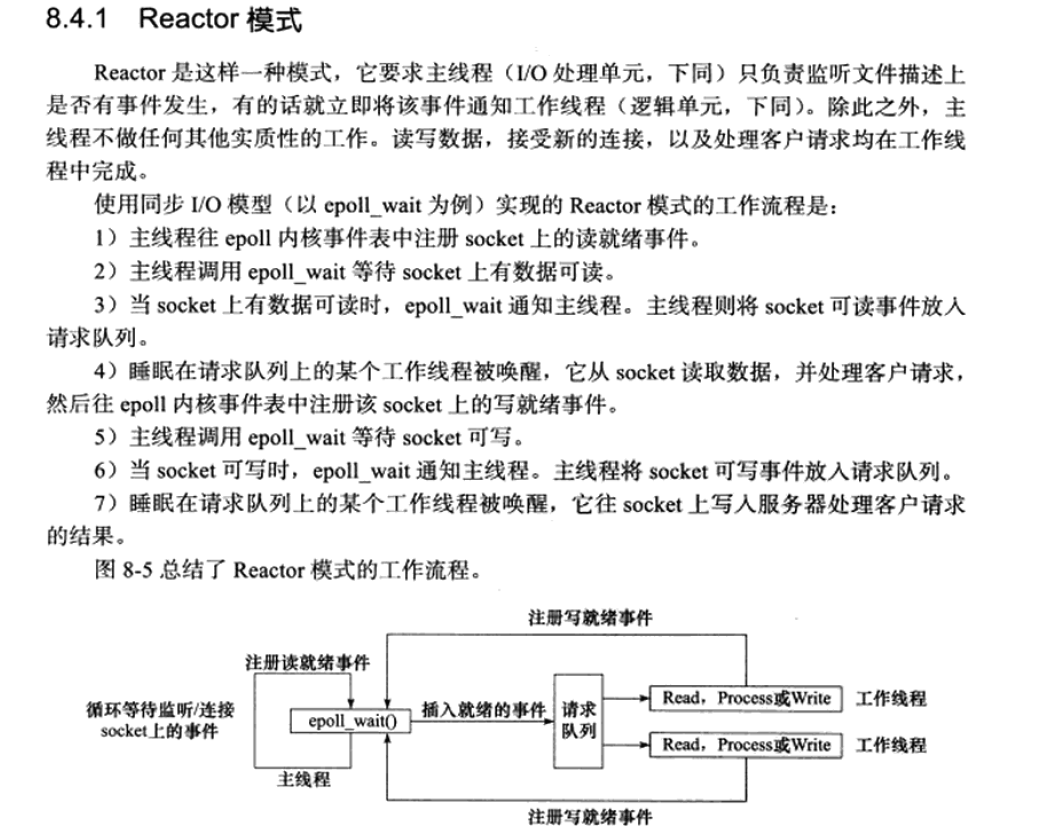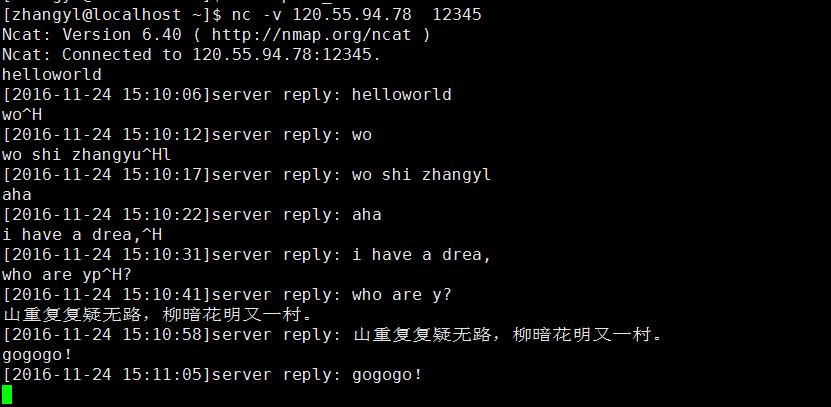epoll实现Reactor模式
转自:http://blog.csdn.net/analogous_love/article/details/53319815
最近一直在看游双的《高性能Linux服务器编程》一书,下载链接: http://download.csdn.net/detail/analogous_love/9673008
书上是这么介绍Reactor模式的:
按照这个思路,我写个简单的练习:
- /**
- *@desc: 用reactor模式练习服务器程序,main.cpp
- *@author: zhangyl
- *@date: 2016.11.23
- */
- #include <iostream>
- #include <string.h>
- #include <sys/types.h>
- #include <sys/socket.h>
- #include <netinet/in.h>
- #include <arpa/inet.h> //for htonl() and htons()
- #include <unistd.h>
- #include <fcntl.h>
- #include <sys/epoll.h>
- #include <signal.h> //for signal()
- #include <pthread.h>
- #include <semaphore.h>
- #include <list>
- #include <errno.h>
- #include <time.h>
- #include <sstream>
- #include <iomanip> //for std::setw()/setfill()
- #include <stdlib.h>
- #define WORKER_THREAD_NUM 5
- #define min(a, b) ((a <= b) ? (a) : (b))
- int g_epollfd = 0;
- bool g_bStop = false;
- int g_listenfd = 0;
- pthread_t g_acceptthreadid = 0;
- pthread_t g_threadid[WORKER_THREAD_NUM] = { 0 };
- pthread_cond_t g_acceptcond;
- pthread_mutex_t g_acceptmutex;
- pthread_cond_t g_cond /*= PTHREAD_COND_INITIALIZER*/;
- pthread_mutex_t g_mutex /*= PTHREAD_MUTEX_INITIALIZER*/;
- pthread_mutex_t g_clientmutex;
- std::list<int> g_listClients;
- void prog_exit(int signo)
- {
- ::signal(SIGINT, SIG_IGN);
- ::signal(SIGKILL, SIG_IGN);
- ::signal(SIGTERM, SIG_IGN);
- std::cout << "program recv signal " << signo << " to exit." << std::endl;
- g_bStop = true;
- ::epoll_ctl(g_epollfd, EPOLL_CTL_DEL, g_listenfd, NULL);
- //TODO: 是否需要先调用shutdown()一下?
- ::shutdown(g_listenfd, SHUT_RDWR);
- ::close(g_listenfd);
- ::close(g_epollfd);
- ::pthread_cond_destroy(&g_acceptcond);
- ::pthread_mutex_destroy(&g_acceptmutex);
- ::pthread_cond_destroy(&g_cond);
- ::pthread_mutex_destroy(&g_mutex);
- ::pthread_mutex_destroy(&g_clientmutex);
- }
- bool create_server_listener(const char* ip, short port)
- {
- g_listenfd = ::socket(AF_INET, SOCK_STREAM | SOCK_NONBLOCK, 0);
- if (g_listenfd == -1)
- return false;
- int on = 1;
- ::setsockopt(g_listenfd, SOL_SOCKET, SO_REUSEADDR, (char *)&on, sizeof(on));
- ::setsockopt(g_listenfd, SOL_SOCKET, SO_REUSEPORT, (char *)&on, sizeof(on));
- struct sockaddr_in servaddr;
- memset(&servaddr, 0, sizeof(servaddr));
- servaddr.sin_family = AF_INET;
- servaddr.sin_addr.s_addr = inet_addr(ip);
- servaddr.sin_port = htons(port);
- if (::bind(g_listenfd, (sockaddr *)&servaddr, sizeof(servaddr)) == -1)
- return false;
- if (::listen(g_listenfd, 50) == -1)
- return false;
- g_epollfd = ::epoll_create(1);
- if (g_epollfd == -1)
- return false;
- struct epoll_event e;
- memset(&e, 0, sizeof(e));
- e.events = EPOLLIN | EPOLLRDHUP;
- e.data.fd = g_listenfd;
- if (::epoll_ctl(g_epollfd, EPOLL_CTL_ADD, g_listenfd, &e) == -1)
- return false;
- return true;
- }
- void release_client(int clientfd)
- {
- if (::epoll_ctl(g_epollfd, EPOLL_CTL_DEL, clientfd, NULL) == -1)
- std::cout << "release client socket failed as call epoll_ctl failed" << std::endl;
- ::close(clientfd);
- }
- void* accept_thread_func(void* arg)
- {
- while (!g_bStop)
- {
- ::pthread_mutex_lock(&g_acceptmutex);
- ::pthread_cond_wait(&g_acceptcond, &g_acceptmutex);
- //::pthread_mutex_lock(&g_acceptmutex);
- //std::cout << "run loop in accept_thread_func" << std::endl;
- struct sockaddr_in clientaddr;
- socklen_t addrlen;
- int newfd = ::accept(g_listenfd, (struct sockaddr *)&clientaddr, &addrlen);
- ::pthread_mutex_unlock(&g_acceptmutex);
- if (newfd == -1)
- continue;
- std::cout << "new client connected: " << ::inet_ntoa(clientaddr.sin_addr) << ":" << ::ntohs(clientaddr.sin_port) << std::endl;
- //将新socket设置为non-blocking
- int oldflag = ::fcntl(newfd, F_GETFL, 0);
- int newflag = oldflag | O_NONBLOCK;
- if (::fcntl(newfd, F_SETFL, newflag) == -1)
- {
- std::cout << "fcntl error, oldflag =" << oldflag << ", newflag = " << newflag << std::endl;
- continue;
- }
- struct epoll_event e;
- memset(&e, 0, sizeof(e));
- e.events = EPOLLIN | EPOLLRDHUP | EPOLLET;
- e.data.fd = newfd;
- if (::epoll_ctl(g_epollfd, EPOLL_CTL_ADD, newfd, &e) == -1)
- {
- std::cout << "epoll_ctl error, fd =" << newfd << std::endl;
- }
- }
- return NULL;
- }
- void* worker_thread_func(void* arg)
- {
- while (!g_bStop)
- {
- int clientfd;
- ::pthread_mutex_lock(&g_clientmutex);
- while (g_listClients.empty())
- ::pthread_cond_wait(&g_cond, &g_clientmutex);
- clientfd = g_listClients.front();
- g_listClients.pop_front();
- pthread_mutex_unlock(&g_clientmutex);
- //gdb调试时不能实时刷新标准输出,用这个函数刷新标准输出,使信息在屏幕上实时显示出来
- std::cout << std::endl;
- std::string strclientmsg;
- char buff[256];
- bool bError = false;
- while (true)
- {
- memset(buff, 0, sizeof(buff));
- int nRecv = ::recv(clientfd, buff, 256, 0);
- if (nRecv == -1)
- {
- if (errno == EWOULDBLOCK)
- break;
- else
- {
- std::cout << "recv error, client disconnected, fd = " << clientfd << std::endl;
- release_client(clientfd);
- bError = true;
- break;
- }
- }
- //对端关闭了socket,这端也关闭。
- else if (nRecv == 0)
- {
- std::cout << "peer closed, client disconnected, fd = " << clientfd << std::endl;
- release_client(clientfd);
- bError = true;
- break;
- }
- strclientmsg += buff;
- }
- //出错了,就不要再继续往下执行了
- if (bError)
- continue;
- std::cout << "client msg: " << strclientmsg;
- //将消息加上时间标签后发回
- time_t now = time(NULL);
- struct tm* nowstr = localtime(&now);
- std::ostringstream ostimestr;
- ostimestr << "[" << nowstr->tm_year + 1900 << "-"
- << std::setw(2) << std::setfill('0') << nowstr->tm_mon + 1 << "-"
- << std::setw(2) << std::setfill('0') << nowstr->tm_mday << " "
- << std::setw(2) << std::setfill('0') << nowstr->tm_hour << ":"
- << std::setw(2) << std::setfill('0') << nowstr->tm_min << ":"
- << std::setw(2) << std::setfill('0') << nowstr->tm_sec << "]server reply: ";
- strclientmsg.insert(0, ostimestr.str());
- while (true)
- {
- int nSent = ::send(clientfd, strclientmsg.c_str(), strclientmsg.length(), 0);
- if (nSent == -1)
- {
- if (errno == EWOULDBLOCK)
- {
- ::sleep(10);
- continue;
- }
- else
- {
- std::cout << "send error, fd = " << clientfd << std::endl;
- release_client(clientfd);
- break;
- }
- }
- std::cout << "send: " << strclientmsg;
- strclientmsg.erase(0, nSent);
- if (strclientmsg.empty())
- break;
- }
- }
- return NULL;
- }
- void daemon_run()
- {
- int pid;
- signal(SIGCHLD, SIG_IGN);
- //1)在父进程中,fork返回新创建子进程的进程ID;
- //2)在子进程中,fork返回0;
- //3)如果出现错误,fork返回一个负值;
- pid = fork();
- if (pid < 0)
- {
- std:: cout << "fork error" << std::endl;
- exit(-1);
- }
- //父进程退出,子进程独立运行
- else if (pid > 0) {
- exit(0);
- }
- //之前parent和child运行在同一个session里,parent是会话(session)的领头进程,
- //parent进程作为会话的领头进程,如果exit结束执行的话,那么子进程会成为孤儿进程,并被init收养。
- //执行setsid()之后,child将重新获得一个新的会话(session)id。
- //这时parent退出之后,将不会影响到child了。
- setsid();
- int fd;
- fd = open("/dev/null", O_RDWR, 0);
- if (fd != -1)
- {
- dup2(fd, STDIN_FILENO);
- dup2(fd, STDOUT_FILENO);
- dup2(fd, STDERR_FILENO);
- }
- if (fd > 2)
- close(fd);
- }
- int main(int argc, char* argv[])
- {
- short port = 0;
- int ch;
- bool bdaemon = false;
- while ((ch = getopt(argc, argv, "p:d")) != -1)
- {
- switch (ch)
- {
- case 'd':
- bdaemon = true;
- break;
- case 'p':
- port = atol(optarg);
- break;
- }
- }
- if (bdaemon)
- daemon_run();
- if (port == 0)
- port = 12345;
- if (!create_server_listener("0.0.0.0", port))
- {
- std::cout << "Unable to create listen server: ip=0.0.0.0, port=" << port << "." << std::endl;
- return -1;
- }
- //设置信号处理
- signal(SIGCHLD, SIG_DFL);
- signal(SIGPIPE, SIG_IGN);
- signal(SIGINT, prog_exit);
- signal(SIGKILL, prog_exit);
- signal(SIGTERM, prog_exit);
- ::pthread_cond_init(&g_acceptcond, NULL);
- ::pthread_mutex_init(&g_acceptmutex, NULL);
- ::pthread_cond_init(&g_cond, NULL);
- ::pthread_mutex_init(&g_mutex, NULL);
- ::pthread_mutex_init(&g_clientmutex, NULL);
- ::pthread_create(&g_acceptthreadid, NULL, accept_thread_func, NULL);
- //启动工作线程
- for (int i = 0; i < WORKER_THREAD_NUM; ++i)
- {
- ::pthread_create(&g_threadid[i], NULL, worker_thread_func, NULL);
- }
- while (!g_bStop)
- {
- struct epoll_event ev[1024];
- int n = ::epoll_wait(g_epollfd, ev, 1024, 10);
- if (n == 0)
- continue;
- else if (n < 0)
- {
- std::cout << "epoll_wait error" << std::endl;
- continue;
- }
- int m = min(n, 1024);
- for (int i = 0; i < m; ++i)
- {
- //通知接收连接线程接收新连接
- if (ev[i].data.fd == g_listenfd)
- pthread_cond_signal(&g_acceptcond);
- //通知普通工作线程接收数据
- else
- {
- pthread_mutex_lock(&g_clientmutex);
- g_listClients.push_back(ev[i].data.fd);
- pthread_mutex_unlock(&g_clientmutex);
- pthread_cond_signal(&g_cond);
- //std::cout << "signal" << std::endl;
- }
- }
- }
- return 0;
- }
程序的功能一个简单的echo服务:客户端连接上服务器之后,给服务器发送信息,服务器加上时间戳等信息后返回给客户端。使用到的知识点有:
1. 条件变量
2.epoll的边缘触发模式
程序的大致框架是:
1. 主线程只负责监听侦听socket上是否有新连接,如果有新连接到来,交给一个叫accept的工作线程去接收新连接,并将新连接socket绑定到主线程使用epollfd上去。
2. 主线程如果侦听到客户端的socket上有可读事件,则通知另外五个工作线程去接收处理客户端发来的数据,并将数据加上时间戳后发回给客户端。
3. 可以通过传递-p port来设置程序的监听端口号;可以通过传递-d来使程序以daemon模式运行在后台。这也是标准linux daemon模式的书写方法。
程序难点和需要注意的地方是:
1. 条件变量为了防止虚假唤醒,一定要在一个循环里面调用pthread_cond_wait()函数,我在worker_thread_func()中使用了:
- while (g_listClients.empty())
- ::pthread_cond_wait(&g_cond, &g_clientmutex);
在accept_thread_func()函数里面我没有使用循环,这样会有问题吗?
2. 使用条件变量pthread_cond_wait()函数的时候一定要先获得与该条件变量相关的mutex,即像下面这样的结构:
- mutex_lock(...);
- while (condition is true)
- ::pthread_cond_wait(...);
- //这里可以有其他代码...
- mutex_unlock(...);
- //这里可以有其他代码...
因为pthread_cond_wait()如果阻塞的话,它解锁相关mutex和阻塞当前线程这两个动作加在一起是原子的。
3. 作为服务器端程序最好对侦听socket调用setsocketopt()设置SO_REUSEADDR和SO_REUSEPORT两个标志,因为服务程序有时候会需要重启(比如调试的时候就会不断重启),如果不设置这两个标志的话,绑定端口时就会调用失败。因为一个端口使用后,即使不再使用,因为四次挥手该端口处于TIME_WAIT状态,有大约2min的MSL(Maximum Segment Lifetime,最大存活期)。这2min内,该端口是不能被重复使用的。你的服务器程序上次使用了这个端口号,接着重启,因为这个缘故,你再次绑定这个端口就会失败(bind函数调用失败)。要不你就每次重启时需要等待2min后再试(这在频繁重启程序调试是难以接收的),或者设置这种SO_REUSEADDR和SO_REUSEPORT立即回收端口使用。
其实,SO_REUSEADDR在windows上和Unix平台上还有些细微的区别,我在libevent源码中看到这样的描述:
- int evutil_make_listen_socket_reuseable(evutil_socket_t sock)
- {
- #ifndef WIN32
- int one = 1;
- /* REUSEADDR on Unix means, "don't hang on to this address after the
- * listener is closed." On Windows, though, it means "don't keep other
- * processes from binding to this address while we're using it. */
- return setsockopt(sock, SOL_SOCKET, SO_REUSEADDR, (void*) &one,
- (ev_socklen_t)sizeof(one));
- #else
- return 0;
- #endif
- }
4. epoll_wait对新连接socket使用的是边缘触发模式EPOLLET(edge trigger),而不是默认的水平触发模式(level trigger)。因为如果采取水平触发模式的话,主线程检测到某个客户端socket数据可读时,通知工作线程去收取该socket上的数据,这个时候主线程继续循环,只要在工作线程没有将该socket上数据全部收完,或者在工作线程收取数据的过程中,客户端有新数据到来,主线程会继续发通知(通过pthread_cond_signal())函数,再次通知工作线程收取数据。这样会可能导致多个工作线程同时调用recv函数收取该客户端socket上的数据,这样产生的结果将会导致数据错乱。
相反,采取边缘触发模式,只有等某个工作线程将那个客户端socket上数据全部收取完毕,主线程的epoll_wait才可能会再次触发来通知工作线程继续收取那个客户端socket新来的数据。
5. 代码中有这样一行:
- //gdb调试时不能实时刷新标准输出,用这个函数刷新标准输出,使信息在屏幕上实时显示出来
- std::cout << std::endl;
如果不加上这一行,正常运行服务器程序,程序中要打印到控制台的信息都会打印出来,但是如果用gdb调试状态下,程序的所有输出就不显示了。我不知道这是不是gdb的一个bug,所以这里加上std::endl来输出一个换行符并flush标准输出,让输出显示出来。(std::endl不仅是输出一个换行符而且是同时刷新输出,相当于fflush()函数)。
程序我部署起来了,你可以使用linux的nc命令或自己写程序连接服务器来查看程序效果,当然也可以使用telnet命令,方法:
linux:
nc 120.55.94.78 12345
或
telnet 120.55.94.78 12345
然后就可以给服务器自由发送数据了,服务器会给你发送的信息加上时间戳返回给你。效果如图:
另外我将这个代码改写了成纯C++11版本,使用CMake编译,为了支持编译必须加上这-std=c++11:
CMakeLists.txt代码如下:
- cmake_minimum_required(VERSION 2.8)
- PROJECT(myreactorserver)
- AUX_SOURCE_DIRECTORY(./ SRC_LIST)
- SET(EXECUTABLE_OUTPUT_PATH ./)
- ADD_DEFINITIONS(-g -W -Wall -Wno-deprecated -DLINUX -D_REENTRANT -D_FILE_OFFSET_BITS=64 -DAC_HAS_INFO -DAC_HAS_WARNING -DAC_HAS_ERROR -DAC_HAS_CRITICAL -DTIXML_USE_STL -DHAVE_CXX_STDHEADERS ${CMAKE_CXX_FLAGS} -std=c++11)
- INCLUDE_DIRECTORIES(
- ./
- )
- LINK_DIRECTORIES(
- ./
- )
- set(
- main.cpp
- myreator.cpp
- )
- ADD_EXECUTABLE(myreactorserver ${SRC_LIST})
- TARGET_LINK_LIBRARIES(myreactorserver pthread)
myreactor.h文件内容:
- /**
- *@desc: myreactor头文件, myreactor.h
- *@author: zhangyl
- *@date: 2016.12.03
- */
- #ifndef __MYREACTOR_H__
- #define __MYREACTOR_H__
- #include <list>
- #include <memory>
- #include <thread>
- #include <mutex>
- #include <condition_variable>
- #define WORKER_THREAD_NUM 5
- class CMyReactor
- {
- public:
- CMyReactor();
- ~CMyReactor();
- bool init(const char* ip, short nport);
- bool uninit();
- bool close_client(int clientfd);
- static void* main_loop(void* p);
- private:
- //no copyable
- CMyReactor(const CMyReactor& rhs);
- CMyReactor& operator = (const CMyReactor& rhs);
- bool create_server_listener(const char* ip, short port);
- static void accept_thread_proc(CMyReactor* pReatcor);
- static void worker_thread_proc(CMyReactor* pReatcor);
- private:
- //C11语法可以在这里初始化
- int m_listenfd = 0;
- int m_epollfd = 0;
- bool m_bStop = false;
- std::shared_ptr<std::thread> m_acceptthread;
- std::shared_ptr<std::thread> m_workerthreads[WORKER_THREAD_NUM];
- std::condition_variable m_acceptcond;
- std::mutex m_acceptmutex;
- std::condition_variable m_workercond ;
- std::mutex m_workermutex;
- std::list<int> m_listClients;
- };
- #endif //!__MYREACTOR_H__
myreactor.cpp文件内容:
- /**
- *@desc: myreactor实现文件, myreactor.cpp
- *@author: zhangyl
- *@date: 2016.12.03
- */
- #include "myreactor.h"
- #include <iostream>
- #include <string.h>
- #include <sys/types.h>
- #include <sys/socket.h>
- #include <netinet/in.h>
- #include <arpa/inet.h> //for htonl() and htons()
- #include <fcntl.h>
- #include <sys/epoll.h>
- #include <list>
- #include <errno.h>
- #include <time.h>
- #include <sstream>
- #include <iomanip> //for std::setw()/setfill()
- #include <unistd.h>
- #define min(a, b) ((a <= b) ? (a) : (b))
- CMyReactor::CMyReactor()
- {
- //m_listenfd = 0;
- //m_epollfd = 0;
- //m_bStop = false;
- }
- CMyReactor::~CMyReactor()
- {
- }
- bool CMyReactor::init(const char* ip, short nport)
- {
- if (!create_server_listener(ip, nport))
- {
- std::cout << "Unable to bind: " << ip << ":" << nport << "." << std::endl;
- return false;
- }
- std::cout << "main thread id = " << std::this_thread::get_id() << std::endl;
- //启动接收新连接的线程
- m_acceptthread.reset(new std::thread(CMyReactor::accept_thread_proc, this));
- //启动工作线程
- for (auto& t : m_workerthreads)
- {
- t.reset(new std::thread(CMyReactor::worker_thread_proc, this));
- }
- return true;
- }
- bool CMyReactor::uninit()
- {
- m_bStop = true;
- m_acceptcond.notify_one();
- m_workercond.notify_all();
- m_acceptthread->join();
- for (auto& t : m_workerthreads)
- {
- t->join();
- }
- ::epoll_ctl(m_epollfd, EPOLL_CTL_DEL, m_listenfd, NULL);
- //TODO: 是否需要先调用shutdown()一下?
- ::shutdown(m_listenfd, SHUT_RDWR);
- ::close(m_listenfd);
- ::close(m_epollfd);
- return true;
- }
- bool CMyReactor::close_client(int clientfd)
- {
- if (::epoll_ctl(m_epollfd, EPOLL_CTL_DEL, clientfd, NULL) == -1)
- {
- std::cout << "close client socket failed as call epoll_ctl failed" << std::endl;
- //return false;
- }
- ::close(clientfd);
- return true;
- }
- void* CMyReactor::main_loop(void* p)
- {
- std::cout << "main thread id = " << std::this_thread::get_id() << std::endl;
- CMyReactor* pReatcor = static_cast<CMyReactor*>(p);
- while (!pReatcor->m_bStop)
- {
- struct epoll_event ev[1024];
- int n = ::epoll_wait(pReatcor->m_epollfd, ev, 1024, 10);
- if (n == 0)
- continue;
- else if (n < 0)
- {
- std::cout << "epoll_wait error" << std::endl;
- continue;
- }
- int m = min(n, 1024);
- for (int i = 0; i < m; ++i)
- {
- //通知接收连接线程接收新连接
- if (ev[i].data.fd == pReatcor->m_listenfd)
- pReatcor->m_acceptcond.notify_one();
- //通知普通工作线程接收数据
- else
- {
- {
- std::unique_lock<std::mutex> guard(pReatcor->m_workermutex);
- pReatcor->m_listClients.push_back(ev[i].data.fd);
- }
- pReatcor->m_workercond.notify_one();
- //std::cout << "signal" << std::endl;
- }// end if
- }// end for-loop
- }// end while
- std::cout << "main loop exit ..." << std::endl;
- return NULL;
- }
- void CMyReactor::accept_thread_proc(CMyReactor* pReatcor)
- {
- std::cout << "accept thread, thread id = " << std::this_thread::get_id() << std::endl;
- while (true)
- {
- int newfd;
- struct sockaddr_in clientaddr;
- socklen_t addrlen;
- {
- std::unique_lock<std::mutex> guard(pReatcor->m_acceptmutex);
- pReatcor->m_acceptcond.wait(guard);
- if (pReatcor->m_bStop)
- break;
- //std::cout << "run loop in accept_thread_proc" << std::endl;
- newfd = ::accept(pReatcor->m_listenfd, (struct sockaddr *)&clientaddr, &addrlen);
- }
- if (newfd == -1)
- continue;
- std::cout << "new client connected: " << ::inet_ntoa(clientaddr.sin_addr) << ":" << ::ntohs(clientaddr.sin_port) << std::endl;
- //将新socket设置为non-blocking
- int oldflag = ::fcntl(newfd, F_GETFL, 0);
- int newflag = oldflag | O_NONBLOCK;
- if (::fcntl(newfd, F_SETFL, newflag) == -1)
- {
- std::cout << "fcntl error, oldflag =" << oldflag << ", newflag = " << newflag << std::endl;
- continue;
- }
- struct epoll_event e;
- memset(&e, 0, sizeof(e));
- e.events = EPOLLIN | EPOLLRDHUP | EPOLLET;
- e.data.fd = newfd;
- if (::epoll_ctl(pReatcor->m_epollfd, EPOLL_CTL_ADD, newfd, &e) == -1)
- {
- std::cout << "epoll_ctl error, fd =" << newfd << std::endl;
- }
- }
- std::cout << "accept thread exit ..." << std::endl;
- }
- void CMyReactor::worker_thread_proc(CMyReactor* pReatcor)
- {
- std::cout << "new worker thread, thread id = " << std::this_thread::get_id() << std::endl;
- while (true)
- {
- int clientfd;
- {
- std::unique_lock<std::mutex> guard(pReatcor->m_workermutex);
- while (pReatcor->m_listClients.empty())
- {
- if (pReatcor->m_bStop)
- {
- std::cout << "worker thread exit ..." << std::endl;
- return;
- }
- pReatcor->m_workercond.wait(guard);
- }
- clientfd = pReatcor->m_listClients.front();
- pReatcor->m_listClients.pop_front();
- }
- //gdb调试时不能实时刷新标准输出,用这个函数刷新标准输出,使信息在屏幕上实时显示出来
- std::cout << std::endl;
- std::string strclientmsg;
- char buff[256];
- bool bError = false;
- while (true)
- {
- memset(buff, 0, sizeof(buff));
- int nRecv = ::recv(clientfd, buff, 256, 0);
- if (nRecv == -1)
- {
- if (errno == EWOULDBLOCK)
- break;
- else
- {
- std::cout << "recv error, client disconnected, fd = " << clientfd << std::endl;
- pReatcor->close_client(clientfd);
- bError = true;
- break;
- }
- }
- //对端关闭了socket,这端也关闭。
- else if (nRecv == 0)
- {
- std::cout << "peer closed, client disconnected, fd = " << clientfd << std::endl;
- pReatcor->close_client(clientfd);
- bError = true;
- break;
- }
- strclientmsg += buff;
- }
- //出错了,就不要再继续往下执行了
- if (bError)
- continue;
- std::cout << "client msg: " << strclientmsg;
- //将消息加上时间标签后发回
- time_t now = time(NULL);
- struct tm* nowstr = localtime(&now);
- std::ostringstream ostimestr;
- ostimestr << "[" << nowstr->tm_year + 1900 << "-"
- << std::setw(2) << std::setfill('0') << nowstr->tm_mon + 1 << "-"
- << std::setw(2) << std::setfill('0') << nowstr->tm_mday << " "
- << std::setw(2) << std::setfill('0') << nowstr->tm_hour << ":"
- << std::setw(2) << std::setfill('0') << nowstr->tm_min << ":"
- << std::setw(2) << std::setfill('0') << nowstr->tm_sec << "]server reply: ";
- strclientmsg.insert(0, ostimestr.str());
- while (true)
- {
- int nSent = ::send(clientfd, strclientmsg.c_str(), strclientmsg.length(), 0);
- if (nSent == -1)
- {
- if (errno == EWOULDBLOCK)
- {
- std::this_thread::sleep_for(std::chrono::milliseconds(10));
- continue;
- }
- else
- {
- std::cout << "send error, fd = " << clientfd << std::endl;
- pReatcor->close_client(clientfd);
- break;
- }
- }
- std::cout << "send: " << strclientmsg;
- strclientmsg.erase(0, nSent);
- if (strclientmsg.empty())
- break;
- }
- }
- }
- bool CMyReactor::create_server_listener(const char* ip, short port)
- {
- m_listenfd = ::socket(AF_INET, SOCK_STREAM | SOCK_NONBLOCK, 0);
- if (m_listenfd == -1)
- return false;
- int on = 1;
- ::setsockopt(m_listenfd, SOL_SOCKET, SO_REUSEADDR, (char *)&on, sizeof(on));
- ::setsockopt(m_listenfd, SOL_SOCKET, SO_REUSEPORT, (char *)&on, sizeof(on));
- struct sockaddr_in servaddr;
- memset(&servaddr, 0, sizeof(servaddr));
- servaddr.sin_family = AF_INET;
- servaddr.sin_addr.s_addr = inet_addr(ip);
- servaddr.sin_port = htons(port);
- if (::bind(m_listenfd, (sockaddr *)&servaddr, sizeof(servaddr)) == -1)
- return false;
- if (::listen(m_listenfd, 50) == -1)
- return false;
- m_epollfd = ::epoll_create(1);
- if (m_epollfd == -1)
- return false;
- struct epoll_event e;
- memset(&e, 0, sizeof(e));
- e.events = EPOLLIN | EPOLLRDHUP;
- e.data.fd = m_listenfd;
- if (::epoll_ctl(m_epollfd, EPOLL_CTL_ADD, m_listenfd, &e) == -1)
- return false;
- return true;
- }
main.cpp文件内容:
- /**
- *@desc: 用reactor模式练习服务器程序
- *@author: zhangyl
- *@date: 2016.12.03
- */
- #include <iostream>
- #include <signal.h> //for signal()
- #include<unistd.h>
- #include <stdlib.h> //for exit()
- #include <sys/types.h>
- #include <sys/stat.h>
- #include <fcntl.h>
- #include "myreactor.h"
- CMyReactor g_reator;
- void prog_exit(int signo)
- {
- std::cout << "program recv signal " << signo << " to exit." << std::endl;
- g_reator.uninit();
- }
- void daemon_run()
- {
- int pid;
- signal(SIGCHLD, SIG_IGN);
- //1)在父进程中,fork返回新创建子进程的进程ID;
- //2)在子进程中,fork返回0;
- //3)如果出现错误,fork返回一个负值;
- pid = fork();
- if (pid < 0)
- {
- std:: cout << "fork error" << std::endl;
- exit(-1);
- }
- //父进程退出,子进程独立运行
- else if (pid > 0) {
- exit(0);
- }
- //之前parent和child运行在同一个session里,parent是会话(session)的领头进程,
- //parent进程作为会话的领头进程,如果exit结束执行的话,那么子进程会成为孤儿进程,并被init收养。
- //执行setsid()之后,child将重新获得一个新的会话(session)id。
- //这时parent退出之后,将不会影响到child了。
- setsid();
- int fd;
- fd = open("/dev/null", O_RDWR, 0);
- if (fd != -1)
- {
- dup2(fd, STDIN_FILENO);
- dup2(fd, STDOUT_FILENO);
- dup2(fd, STDERR_FILENO);
- }
- if (fd > 2)
- close(fd);
- }
- int main(int argc, char* argv[])
- {
- //设置信号处理
- signal(SIGCHLD, SIG_DFL);
- signal(SIGPIPE, SIG_IGN);
- signal(SIGINT, prog_exit);
- signal(SIGKILL, prog_exit);
- signal(SIGTERM, prog_exit);
- short port = 0;
- int ch;
- bool bdaemon = false;
- while ((ch = getopt(argc, argv, "p:d")) != -1)
- {
- switch (ch)
- {
- case 'd':
- bdaemon = true;
- break;
- case 'p':
- port = atol(optarg);
- break;
- }
- }
- if (bdaemon)
- daemon_run();
- if (port == 0)
- port = 12345;
- if (!g_reator.init("0.0.0.0", 12345))
- return -1;
- g_reator.main_loop(&g_reator);
- return 0;
- }
完整实例代码下载地址:
普通版本:https://pan.baidu.com/s/1o82Mkno
C++11版本:https://pan.baidu.com/s/1dEJdrih

AtomGit 是由开放原子开源基金会联合 CSDN 等生态伙伴共同推出的新一代开源与人工智能协作平台。平台坚持“开放、中立、公益”的理念,把代码托管、模型共享、数据集托管、智能体开发体验和算力服务整合在一起,为开发者提供从开发、训练到部署的一站式体验。
更多推荐
7824
5
0
- 0
扫一扫分享内容
分享

顶部




 已为社区贡献9条内容
已为社区贡献9条内容
所有评论(0)